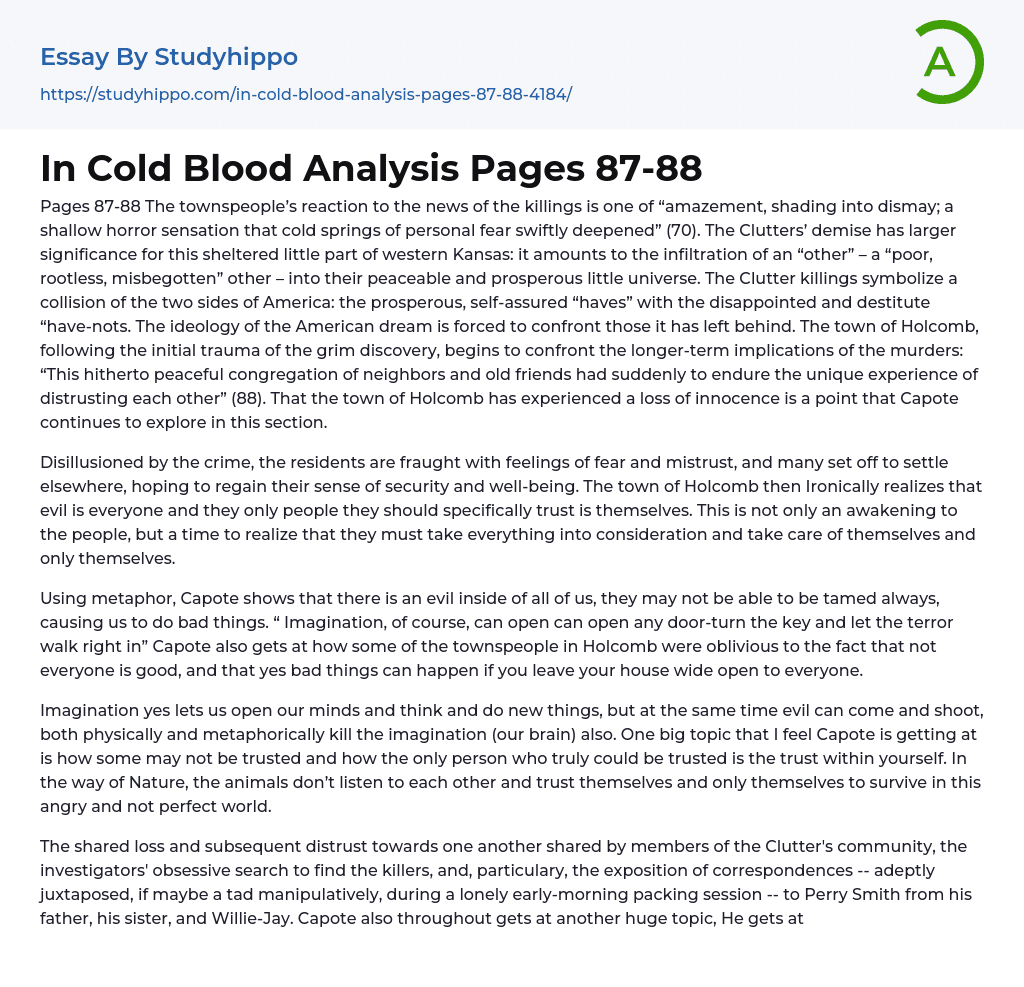Pages 87-88 The townspeople’s reaction to the news of the killings is one of “amazement, shading into dismay; a shallow horror sensation that cold springs of personal fear swiftly deepened” (70). The Clutters’ demise holds greater significance for this small part of western Kansas as it represents the intrusion of an "other” – a “poor, rootless, misbegotten” other – into their peaceful and prosperous world. The Clutter murders serve as a symbol of the clash between the affluent and confident "haves" and the disappointed and impoverished "have-nots." The idea of the American dream is forced to confront those who have been left behind. After the initial shock of the gruesome discovery, the town of Holcomb starts to come to terms with the long-term consequences of the murders: "This previously harmonious gathering of neighbors and old friends suddenly
...had to face the unique experience of doubting each other" (88). Capote continues to explore in this section that the loss of innocence has occurred within the town of Holcomb.
Feeling fearful and distrusting due to the high crime rate, the residents of Holcomb are disillusioned and seek to relocate in order to regain a sense of security and well-being. However, they ironically come to a realization that evil exists within each individual and that they can only truly trust themselves. This awakening prompts them to carefully consider every aspect of their lives and prioritize their own well-being above all else.
Capote uses metaphor to illustrate that every individual possesses a darkness within them, which may sometimes remain uncontrollable and lead to immoral actions. He remarks, "Imagination, of course, can open any door-turn the key and let the terror
walk right in." Additionally, Capote highlights the ignorance of certain residents in Holcomb who fail to recognize the existence of evil and the potential consequences of leaving their homes unprotected for anyone to enter.
Imagination allows us to explore new ideas and possibilities, but it also has the potential to be corrupted and hinder our creativity. Truman Capote touches on the theme of trust, emphasizing that some people may not be trustworthy and the only reliable source of trust is within oneself. Similarly, in Nature, animals rely on their own instincts and self-reliance to survive in a hostile and imperfect world.
The Clutter's community members share a loss and mistrust towards each other. The investigators tirelessly search for the killers. Correspondences from Perry Smith's father, sister, and Willie-Jay are adeptly juxtaposed, though perhaps a bit manipulatively, during a solitary morning packing session. Capote also touches on the irony that death must occur in order for a town to realize the evil within it. This tragic awakening causes people to act differently out of fear of experiencing the same pain. It is somewhat pathetic that death is the only catalyst for people to see the imperfections in their town. Afterward, they are left unsure of what to do with themselves and become watchful and alert. The peaceful congregation of neighbors and old friends now experiences distrust, as they believe the murderer is one of them.The security of Holcomb is greatly disturbed by the Clutter killings, which not only fragment the community but also sow the initial seeds of doubt and suspicion.
In allegorical terms, the residents of Holcomb go through a fall from grace and lose their former innocence
as they are confronted with the reality of the killers and the world they represent. Capote demonstrates this progression chronologically, showing that over time and through various events, people begin to understand their true identities and become more aware of those around them. Capote ironically suggests that evil stays present, even when we believe it is not, and it never truly disappears. We all harbor evil within us, just as the killers linger in the town. The book, particularly this section, takes on a life of its own and unfolds naturally (though not predictably) like a digestive process after a satisfying meal or a tragic event, both metaphorically and literally. Capote shows that truth comes with trauma, leading to self-discovery, distrust towards others, and the lingering presence of evil in each individual's life.
- Action Potential essays
- Blood essays
- Body essays
- Brain essays
- Childbirth essays
- Eye essays
- Glucose essays
- Heart essays
- Human Physiology essays
- Immune System essays
- Kidney essays
- Muscle essays
- Nervous System essays
- Neuron essays
- Poison essays
- Puberty essays
- Sense essays
- Skeleton essays
- Skin essays
- 1984 essays
- A Farewell to Arms essays
- A Good Man Is Hard to Find essays
- A Hanging essays
- A Lesson Before Dying essays
- A Long Way Gone essays
- A Rose For Emily essays
- A Separate Peace essays
- A Tale Of Two Cities essays
- A Very Old Man With Enormous Wings essays
- Adventures Of Huckleberry Finn essays
- Alice in Wonderland essays
- All Quiet on The Western Front essays
- Allegory of the Cave essays
- An occurrence at owl creek bridge essays
- Animal Farm essays
- Anthem essays
- Antigone essays
- Arthur Conan Doyle essays
- As I Lay Dying essays
- Atticus Finch essays
- Barn Burning essays
- Battle Royal essays
- Beauty and The Beast essays
- Beloved essays
- Boo Radley essays
- Brave New World essays
- Candide essays
- Castle essays
- Characters In Hamlet essays
- Characters In Romeo And Juliet essays




